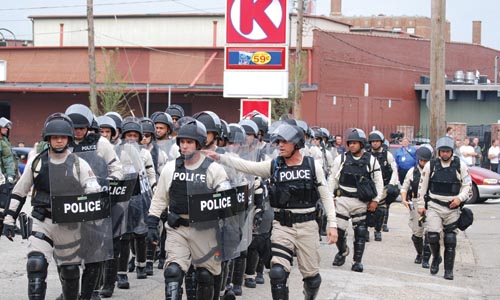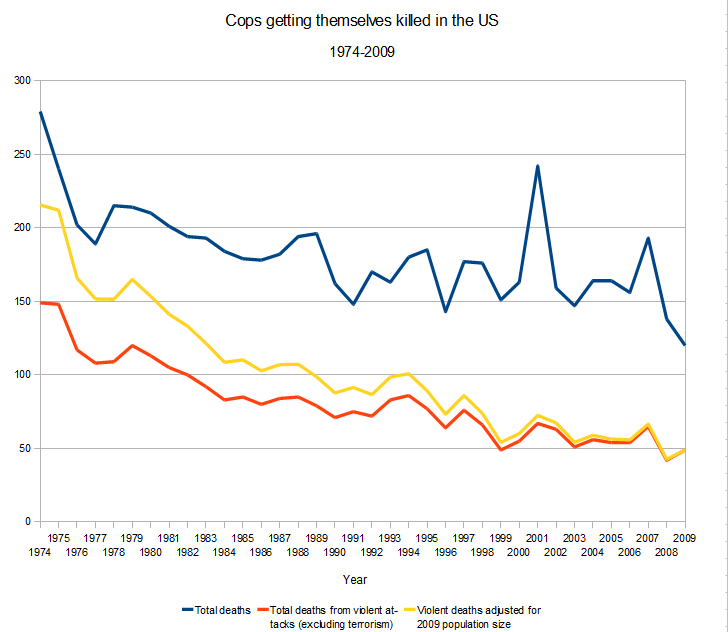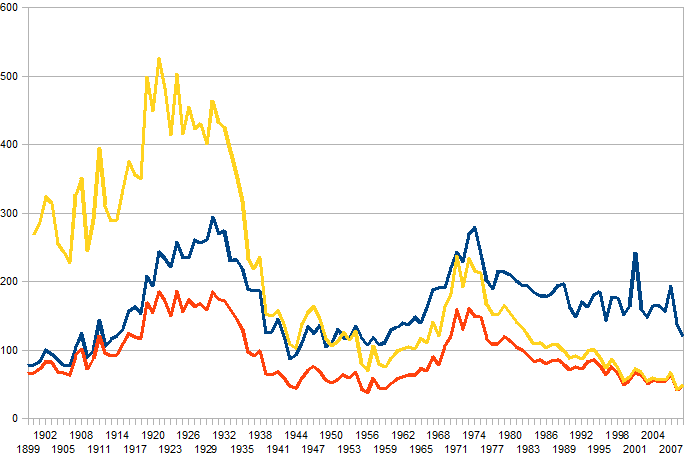Here’s a good article from a while back in The Nation (which I’m mentioning now because I just recently saw it, thanks to the November Coalition listserv). In these days, I’m not surprised to see that it was written,[] but I am (pleasantly) surprised to see that it got published in a prominent place in an organ of the official Left. In any case, it’s right-on, and well worth reading.
Well, in the parts I haven’t crossed out, anyway. The article was originally called Ten Things You Can Do To Reduce Incarceration,
but, well, we’ll see what becomes of that.
The United States has 5 percent of the world’s population and 25 percent of the world’s prisoners. Criminologists have found that when too many people are incarcerated the crime rate actually increases. Imagine if we spent some of the $60 billion a year prisons cost on education, job training and healthcare. (0) Paul Butler, a law professor, former federal prosecutor and author of Let’s Get Free: A Hip-Hop Theory of Justice suggests ways to undo the damage caused by overincarceration. If you have state specific resources send them to nationtenthings@gmail.com.
1 Do your jury duty. If you are a juror in a non-violent drug case, vote not guilty. Jury nullification–an acquittal based on principle–is perfectly legal. The framers intended jurors to be a check on unjust prosecutions and bad laws. Click here for more information. (1)
2 Pay a kid to graduate. A report by the RAND Corporation found that paying students to finish high school prevented more crime than the toughest sentencing laws. Dropping out of school creates a high risk of ending up in jail. Work with your community group or place of worship to create a program to pay at-risk students to graduate from high school.
3 Come out of the closet about your drug use. War on drugs propaganda says users are bad people. Let your fellow citizens know the real face of the American drug user. Don’t be scared. Barack Obama admitted he used marijuana and cocaine during his youth, and he got elected president!
4 Hire a formerly incarcerated person. Every year about 600,000 people get out of jail. The odds are against their landing a job, which is a huge factor in why more than half will be re-arrested within a year. Go to Hired Network. Go here if you are formerly incarcerated or visit Reentry Policy.
5 Vote for politicians who are smart on crime. (5) Tougher sentences aren’t the answer. In the US criminal sentences are twice as long as those in England, three times those in Canada and five to ten times those in France. And yet crime rates in US cities are higher than in those nations.
6 Just say no to the police. When cops request your consent to pat you down, peek inside your backpack or purse or search your car, you have the right to decline. When they have a warrant or other legal cause to search, like at an airport, they don’t have to ask. Too many Americans–especially in communities of color–are scared to death of the police. Go to ACLU “Know Your Rights” or the Malcolm X Grassroots Movement to learn your rights if stopped by the police.
7 Don’t be a professional snitch. If you have information about a violent or property crime, call the police. Witnessing is fine. But snitches get paid either in cash or a break in their own prosecution for tattling. They make untrustworthy witnesses. Snitches are responsible for almost half the wrongful convictions of people who were later found to be innocent.
8 Talk up the trades. Retail drug selling pays about as much as working at McDonald’s. As the book Freakonomics pointed out, that’s why most drug dealers live with their moms. Many dealers would prefer a more lucrative–and safer–line of work. People who don’t see themselves as “college material” and might otherwise end up on the street should be encouraged to get training for a blue collar trade. Click here for more information.
9 Let accused people discover the evidence against them. There are very few discovery requirements in criminal law. Many defendants in criminal cases don’t learn who the witnesses are–or even get copies of police reports–until the day of the trial. “Open discovery” laws like one Ohio recently introduced will enable criminal defendants to see the state’s evidence against them before trial. (9)
10 Listen to hip-hop. No other aspect of pop culture has considered as carefully, and as personally, the costs and benefits of the American punishment regime. Members of the hip-hop nation often come fr om the most dangerous communities and have a vested interest in safety . They help us understand that treating people who have messed up with love and dignity is, for law-abiding citizens, an act of self-interest and community safety. Visit AllHipHop.com or Hip Hop Caucus to learn the political side of hip-hop.
Here’s the quibbles from along the way.
(0) Well. If we were free to spend some of that $60,000,000 robbed out of our pockets on education, job training, healthcare, or any of the other infinite needs of civilized beings, that would indeed be something to imagine. Unfortunately, I expect that the other means the special kind of “we” here (the kind that means they, a political bureaucracy that ordinary people like you and me have no effective control over). If they spend the money on government education, government job training, and government healthcare, I expect that it will work out as well as anything else government does at propping up big corporations, corralling kids against their will, and otherwise maintaining business-as-usual and the social and economic status quo. Oh well.
(1) This really is an awesome idea, as far as it goes: if you have the opportunity to free an innocent drug-user or drug-dealer through jury nullification, of course I think you ought to take the opportunity. But how often are you likely to get the chance? Given how narrow the context is, this is really important for the individual life you can save, but it’s only going to be something that reduces incarceration in aggregate if it becomes part of a large-scale culture of non-cooperation with the state. In which case (1) really just depends on the kind of cultural change discussed in the other points. Anyway, call it half a thing you can do.
(5) Oh, come on. Really? Of course, I agree that the government’s crime policies are foolish and destructive. But that’s only a reason to go around voting for smarter
politicians if voting for smarter
politicians changed anything about crime policies or the War on Drugs. Call me back when that starts working for you.
(9) There’s nothing wrong with this proposal, as a procedural reform. But it’s not something you can do to reduce incarceration — changing government laws is something government could do. But if you
somehow managed to accumulate the political connections to make the government do what you want it to do, you probably aren’t the kind of person who cares about this sort of thing; and for the rest of us, the you
here is really just they,
filtered through the illusion of democratic control. In which case, this is something that they could do to reduce incarceration. But of course there’s no reason to expect that they will.
Anyway.
That done, with those items crossed out, this is a really solid list, and does a great job of stressing the importance of moving beyond stupid, stupidifying political reform campaigns, and encourages you to make a real difference for your own life and your neighbors’ lives, by practicing solidarity on the ground, engaging positively with criminalized cultures and criminalized communities, refusing to collaborate with government cops and prosecutors, coming out of the closet, standing up for yourself and your neighbors, and generally working to shift the terms of the debate, to change the culture that fosters sado-statist mass incarceration, and the creation of positive alternatives that change the material condition faced by criminalized people, primarily by means of practical solidarity and person-to-person grassroots mutual aid.
Call it a solid seven and a half. That’s pretty awesome.
 Last month,
Last month, 
